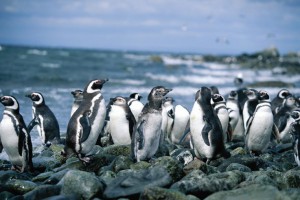We've uniquely combined our complete Machu Picchu experience and Quito with the Ecuadorean Highlands and our intimate Galapagos cruise. In the engaging company of our expert guides and naturalists and never more than 16 guests, you'll enjoy in-depth sightseeing, unique cultural encounters and a complete program of shore discoveries. By night, you'll love our 5-star hotels and your stylish Upper Deck outside stateroom aboard La Pinta.
Genovesa (Tower) Island
Genovesa (Tower) Island
The island is home to Darwin Bay and colonies of Frigates, Red Footed and Masked Boobies. Just behind the beach one sees inland tide pools and outcrops of black rock and saltbushes, frequented by feeding Wandering Tattlers, Turnstones, Whimbrels, Lava Gulls and Fiddler Crabs. Genovesa, as a result of its isolation, remains an undisturbed nesting ground for these birds, who fish in its rich waters, and lacks introduced as well as native land animals and reptiles-the only reptile, in fact, is a small subspecies of marine iguana. This island is a must for bird enthusiasts of all ages.
|
Destination Guide
|
Isla Santiago
Isla Santiago
Also known as San Salvador or James, Santiago is the fifth-largest and one of the most visited of the Galapagos Islands. It is uninhabited, and there was a failed attempt at colonizing it in the 1930s. There are three visitor sites, and the two on the western coast of the island are Puerto Egas and Playa Espumilla.
Puerto Egas, on James Bay, offers a black-sand landing beach with impressive wind-carved, tuff-stone layers. The relatively flat, black-lava shoreline is broken up by pools, caves and promenades, where hundreds of marine iguanas sun themselves, seek mates and slither into the sea. Their black skin camouflages them among the lava rocks.
Playa Espumilla is a nesting area for sea turtles and, when the lagoon is filled, a place to see white-cheeked pintail ducks and flamingos. The estimated flamingo population on the Galapagos is around 500-1,000. These animals are an endemic subspecies of the flamingos commonly found in the Caribbean region.
Dozens of bright red-orange Sally Lightfoot crabs, among the only people-shy creatures on the islands, frolic in the tide pools and scurry on the rocks. The area also has a colony of fur seals, which are endemic to the islands but closely related to fur seals in Antarctica. The snorkeling is good along the rocks, where it's possible to see colorful fish, moray eels and sharks.
At the east end of the island is Sullivan's Bay (across from Bartolome Island). A volcano spewed a stream of lava there in 1897, and it still reaches to the sea. Visitors can follow a marked trail over the lava to see fascinating untouched volcanic formations such as pahoehoe lava. Only a few plants have taken hold there, including an unusually shaped cactus and some carpetweed.
Sombrero Chino (Chinese Hat) is a popular snorkeling spot 656 ft/200 m off the coast. These beautiful waters are a playground for sea lions, sharks, penguins and manta rays. A series of seven diving sites offer divers the chance to get up close to the best of Galapagos' marine life.
|
Destination Guide
|
Isla Bartolome
Isla Bartolome
This small, barren island offers guests the opportunity to observe firsthand its volcanic formations and moon-like landscape.
|
Destination Guide
|
|
Chinese Hat Island
|
|
|
Eden Islet
|
|
Isla Santa Cruz
Isla Santa Cruz
Here, the Charles Darwin Station offers insight into ongoing research and conservation in the Galapagos. Also located on this island is Cerro Dragon, one of the best places to spy land iguanas.
|
Destination Guide
|
Isla Baltra
Isla Baltra
Today Baltra is the most important airport of Galápagos and a small navy base for Ecuador. Baltra has suffered most from human settling and does not have any visitor sites. Many cruises start from the its harbour and already there pelicans and noddies will welcome you.
To the north lies Mosquera, a small sandy bank with a large colony of sea lions. Go swimming and snorkeling on the beach.
|
|
Guayaquil
Guayaquil
This tropical city of over two million people spreads out along the banks of chocolate-colored Guayas River, about 12 miles from Gulf of Guayaquil. The river, navigable for the largest of ocean vessels, makes this one of the Pacific's most important and best-protected ports. Visitors find the city itself is primarily valued as a gateway for the Galapagos Island and the rest of the country. Ecuador's scenic capital Quito can be reached via a 45-minute flight from Guayaquil. Lush green hillsides, snow-capped volcano cones and brilliant sunshine combine to make the city a charming surprise. Guayaquil offers a rich and interesting history. The meeting of Bolivar and San Martin is commemorated with the colonnaded La Rotunda facing the river. Other attractions include Colon Park where the city was founded, the Santo Domingo Church and the cemetery, often called the White City. With its elaborate tombs and monuments, this is one of South America's most striking burial grounds.
|
Destination Guide
|
Galapagos Islands
Galapagos Islands
The Galápagos Archipelago is a unique world heritage. Situated on the equator 600 miles off the coast of South America, this remote volcanic archipelago remains much as it was millions of years ago. Over the centuries, animal and plant life from the Americas reached the islands and gradually evolved into new forms. Many of its species are found nowhere else on earth. Since Darwin's famous voyage, its marine and terrestrial ecosystems have provided a wealth of information and source of inspiration for people through the world. The "Enchanted Islands" continue to play an important role in our understanding of life on earth. The Galapagos experience offers world travelers a way to step back in time, to visit an isolated, relatively untouched place on earth.
|
Destination Guide
|
Machu Picchu
Machu Picchu
Machu Picchu is a fortress city of the ancient Incas, in a high saddle between two peaks 50 miles NW of Cuzco, Peru. The extraordinary pre-Columbian ruin consists of five sq. miles of terraced stonework link by 3,000 steps; it was virtually intact when discovered by Hiram Bibghan in 1911.
|
Destination Guide
|
Cuzco
Cuzco
The Cuzco (Cusco) region of Peru combines Inca legacy with Spanish colonial architecture in an atmosphere at once provincial and sublime. The chaotic marketplaces where campesinos barter grain or potatoes for multi-colored fabric belie the mute spirituality of the Lost Cities, where Inca stonework conveys order and balance. Such diversity enhances this inspiring nine-day adventure. The blue sky radiates with an intensity achieved only at high altitudes (the city of Cuzco lies 11,150 feet above sea level), while the landscape offers its unique pattern of exacting agricultural grids and tangled jungle masses.
|
Destination Guide
|
Lima
Lima
Lima, "the City of the Kings," became the effective capital of the Viceroyalty of Peru, established 1560. Today, a visit to Lima may serve as a unique Peruvian experience that offers a glimpse into the Andean world, Spanish tradition and the country's modern aspect. Visit handsome old buildings and baroque churches that testify to the city's religious background and the Plaza de Armas, shared by the realms of the Catholic church, municipality and national government. The pre-Inca ruins of Pachacamac lie a short distance south of the city. Once a ceremonial site, Pachacamac has been the most important religious center of the Andean world since before the age of Christ. Stop and admire The Temple of the Sun and the Moon, Lima's outstanding museums, and Machu Picchu - a "Jewel in the Mist."
|
Destination Guide
|
Quito
Quito
Quito is a fantastic place to visit and the best place to start your Latin American journey. Quito is also the entertainment center in Ecuador with new bars and discos opening every week and also the best place to shop, either at the small souvenir shops or at big malls. Quito has many interesting cultural sites, historical sites, museums, private galleries, churches, exhibition centers, and theaters.
|
Destination Guide
|






